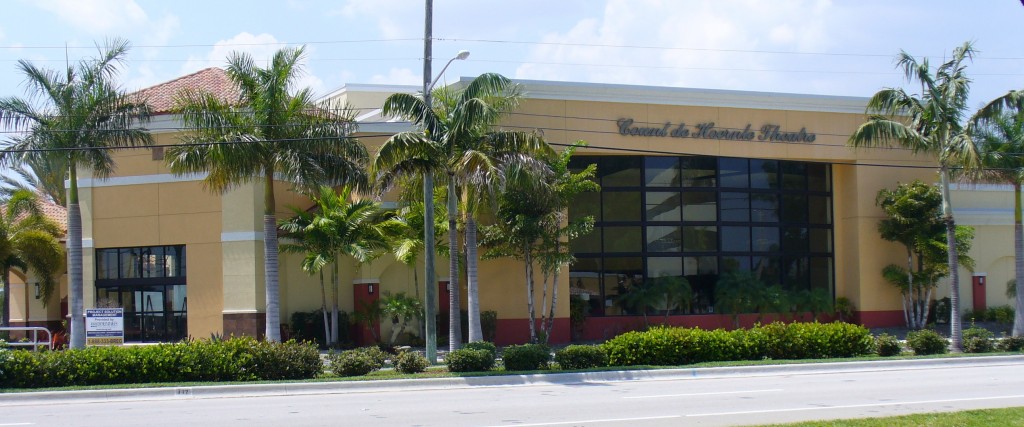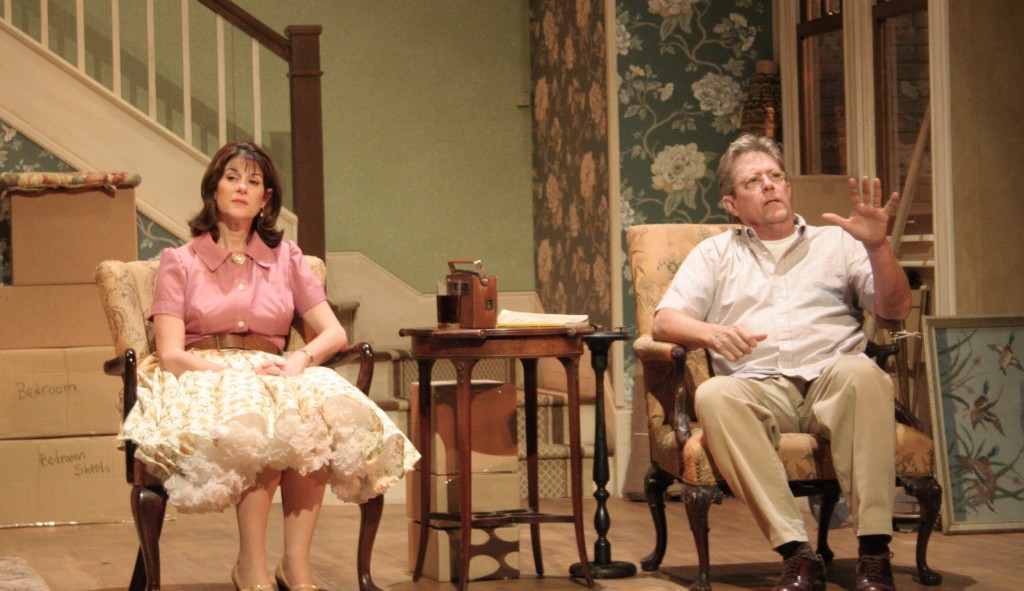By Bill Hirschman
UPDATED 4:49 p.m.
The interested parties aren’t the usual suspects. A workout gym, a church, a charter school, a medical facility. Everything but a theater.
When the house that the Caldwell Theatre Company built goes on the cyberspace auction block Tuesday, court records hold out little hope that the facility will end up hosting Shakespeare or Conor McPherson.
More likely, the Boca Raton property will revert back to the bank that reluctantly holds two mortgages on the property and anxiously seeks a buyer, the records indicate.
While the Caldwell technically exists on paper, the sale formally lowers the curtain on one of the premier regional theaters in South Florida’s cultural history — what had been the second oldest professional company still in operation until this summer. It presented a dazzling range of benchmark-setting theater over 37 seasons under artistic directors Michael Hall and Clive Cholerton, winning national acclaim and enough Carbonell Awards to literally fill two breakfronts in its patrons’ lounge.
The nearly 30,000-square foot cream colored jewel box has been shuttered since April 2 when the court-ordered receiver evicted the company. It had fallen victim to a long list of problems that included a shrinking base of subscribers and debts whose total even now has not been revealed.
The auction was ordered Aug. 24 by the Palm Beach Circuit Court after foreclosing on the two Legacy Bank of Florida mortgages totaling $5.89 million. With interest and late charges, the debt tops $7.2 million, court records show.
Come Tuesday morning, the 1 ½ acres, parking lot, edifice with a wall of glass, and remaining contents will be one of 88 properties offered through an on-line system designed to efficiently dispose of thousands of homes and business that have fallen prey to the Great Recession.
Bidders for the property must pre-qualify, including depositing about 5 percent of the maximum amount they expect to bid. But their identities are secret. Only the name of winning bidder or its agent must be revealed along with the price after the auction.
Over the summer, several parties have expressed interest in the facility at 7901 N. Federal Highway, even touring the building, according to the legal documents filed last month by the receiver, Brenner Real Estate Group.
 Among them:
Among them:
* The advisory committee of an unnamed church, described as “extremely interested” in a lease with an option to buy.
* A “specialty user” interested in a lease with option to buy and reportedly working with city and county officials for help in financing.
* A company that develops health clubs
* A “medical user.”
* An unnamed charter school whose representatives were concerned about the price and insufficient parking.
In an earlier report, the Brenner company indicated at least five other groups had inquired about short-term rentals including North Broward Preparatory School, the Broward Center for the Performing Arts and Entr’acte Theatrix, a semi-professional theater program for young actors. The receiver tried to generate interest by contacting other performing arts centers and government agencies.
But the property could end up back with the bank if Tuesday’s bids are not what the bank feels the mortgages and associated costs add up to, said Scott Brenner.
In past months, Brenner’s staff has been working with Cholerton and Hall among others to return personal property and sentimental mementos from the site, Brenner and court records indicate. Believed to be among those items are many of the photographs of past productions as well as the theater’s Carbonell Awards.
The major remaining dispute centers on a chandelier in the Founder’s Room that Michael Hall said he was given as a personal bequest in the will of theater co-founder Frank Bennett. The chandelier had been a gift to Bennett from an aunt and Bennett had loaned it to the company where it was hung in two of its previous homes “as something of beauty to hang from open, pipe-filled ceilings,” Hall wrote in an email Monday. “It became a symbol of Caldwell, elegance in raw space.”
But the bank and receiver’s position is that the fixtures are part of the facility. Hall is appealing that decision in court in late November.
“The chandelier has little monetary worth,” Hall wrote, “but it is a symbol of the history of the Caldwell and needs to have a life in a proper place, museum or historic building.”
The Caldwell saga began in December 1975 when Hall and Bennett, a scenic designer, created the company at the urging of Rubbermaid Corp. founder James R. Caldwell.
A Q&A with Michael Hall
Caldwell Theatre Company co-founder Michael Hall stepped down as artistic director in 2009, and has been travelling and writing ever since. But he returned to the Caldwell in February 2011 to direct the drama Last Fall.
In an email interview Monday, edited here, Hall looked back on the company and its legacy. To read his comments, click here.
It opened its first show, Neil Simon’s lesser comedy The Star Spangled Girl in a small auditorium on what is now the campus of Lynn University. Four years later it moved to the Boca Raton Mall. In 1989, it renovated and moved into its best known space in the Levitz Shopping Plaza just south of its current location.
Despite the cramped space with no flies or wing space, Hall gave his audience frothy farces, contemporary dramas, chamber musicals, large cast classics and gay-themed plays during the summer off-season.
Some of its most acclaimed works were chancier ventures than the mainstream fare prevalent in the region: Bent, Papa, The Laramie Project, Take Me Out, The Elephant Man and Gross Indecency: The Three Trials of Oscar Wilde.
What most observers cite as the fatal if unintentional misstep was Hall and his board’s dream since 1991 to build new theater, spurred on by eventual plans to raze the Levitz property for development.
The plan was to raise enough money to have as small a mortgage as possible and to attract endowments. Palm Beach arts benefactress Countess Henrietta de Hoernle pledged $1 million. Hall spoke about the likelihood of opening a $5 million theater with a mortgage-burning ceremony. That money was nearly in hand, he said in the mid-2000s.
But plans to raze the Levitz property fast-tracked in 2005, accelerating the Caldwell timetable ahead of the fund-raising. Mortgages, architectural plans and construction began in the spring of 2006.
But at the exact same time, serious and unexpected problems began crippling the project. Construction materials became scarce and expensive because of county-wide demand to repair the ravages of Hurricane Wilma from the year before. The economy began imploding, the real estate bubble burst, government grants evaporated and donors balked on contributions. Even after cutting back on the scope, the projected price doubled and the theater had to assume a seven-year loan from Legacy Bank that it had never planned on.
Still, the Count de Hoernle Theatre opened in December 2007 with a production of John Patrick Shanley’s Doubt.
In 2009, Hall turned over the reins and the shaky finances to Cholerton, an actor/director who ran an investment advisory business. Cholerton had joined the board of directors nine years earlier and became chairman two years later.
His most noticeable headache was that the subscriber base was shrinking. This was occurring at almost every theater, but many observers blame Cholerton’s commitment to mix in more adventurous fare than his aging audience was comfortable with. Others counter that the Caldwell had a history under Hall of gently pushing at the boundaries of what its audiences would accept. Cholerton was also hoping that the choices would attract a younger audience to augment the older patrons who were disappearing due to mortality and illness.
A few Cholerton’s shows were artistic failures, but many others were some of the best work the company had delivered in years including the world premiere of the musical Vices! A Love Story, Clybourne Park, The Whipping Man, Last Fall, Michael McKeever’s Stuff and its penultimate production, The Elaborate Entrance of Chad Deity which was critically acclaimed but could not attract an audience.
Cash flow became a pressing problem. A past board president and another former board member filed lawsuits in 2010 and 2012 to press the theater to repay $85,000 in personal loans.
Bank officials complained last winter that they hadn’t been paid mortgage payments since August 2011, even after restructuring the debt into two loans.
In February 2012, Cholerton was considering federal Chapter 11 bankruptcy protection to give the company time to fiscally reorganize, but the filing never occurred. The bank asked the court to foreclose on the mortgages that month.
Brenner was appointed on March 16 this year as receiver to control all finances. Cholerton hoped to convince Brenner to work with the theater to continue operations indefinitely and aid in restructuring the finances. Cholerton succeeded in persuading Brenner that the imminent show, the musical Working, could remain in the black, court records state. In actuality, it did so poorly at the box office that the Caldwell had to dip into its bond with Actors Equity union to pay its cast, Cholerton said.
That meant the Caldwell needed cash to renew its essential bond, but the coffers were completely bare, court records state. Brenner refused to advance any money to mount the last show of the season, the world premiere of Christopher Demos-Brown’s Our Lady of Allapattah. (That show will have a reading at GableStage on Nov. 19 this year.)
Working closed April 1. The next day – hours before the Caldwell vied for the Best Play Carbonell Award for Clybourne Park— the receiver had the box office staff escorted out of the building and changed the locks.












 A PaperStreet Web Design
A PaperStreet Web Design
